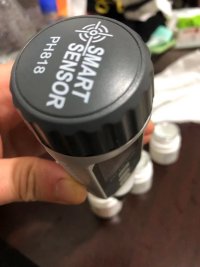bracconiere
Jolly Alcoholic - In Remembrance 2023
No you have that a little wrong you determine the raw alkalinity just before brewing and the titrate the excess alkalinity with hydrochloric acid and sulphuric acid to a predetermined level. For the greater majority of pale to medium dark beers this is about 25 ppm for very dark beers 50ppm. The benefit of using those acids is that they are both compatible with the mineral needs of brewing process and you can predict exactly how much of each you need to add to the volume of brewing water to get the desired alkalinity. Unlike lactic acid and phosphoric, acids one of which precipitates Calcium and the other which taints the flavour of some beers if added in large quantities, the sulphate and chloride ions are both beneficial. Taking a pH reading of the raw water tells you little of its buffering capabilities. People rely on what their water companies tell them about their water with respect to alkalinity I do not I measure it before I brew. Last summer many of my brews would have been very different had I not estimated my brew water alkalinity. At times the alkalinity was 30+ percent higher than their average figure.
But that is not the issue here the point was made that knowing pH is a very important in brewing and it is not. The important issue is making sure that when you mash your grains the mash pH falls within a range that is suitable for the enzymic process. Knowing the alkalinity of the liquor before mashing allows you to mash safe in the knowledge that your mash will have a pH within that window. I am certainly not one for measuring the pH of my current brew to try to possibly influence my next brew bizarrely armed with only a mash pH from the previous mash to determine what went wrong. I posted a calculator earlier on it is a fool proof way of perfectly hitting the pH window for mashing.
Any way have a nice day and best wishes for all your brews.
i love your walls of text! seriously!

i would be curious where you're getting 'food grade' HCl though? or do you just use pool acid?


![Craft A Brew - Safale S-04 Dry Yeast - Fermentis - English Ale Dry Yeast - For English and American Ales and Hard Apple Ciders - Ingredients for Home Brewing - Beer Making Supplies - [1 Pack]](https://m.media-amazon.com/images/I/41fVGNh6JfL._SL500_.jpg)
























































